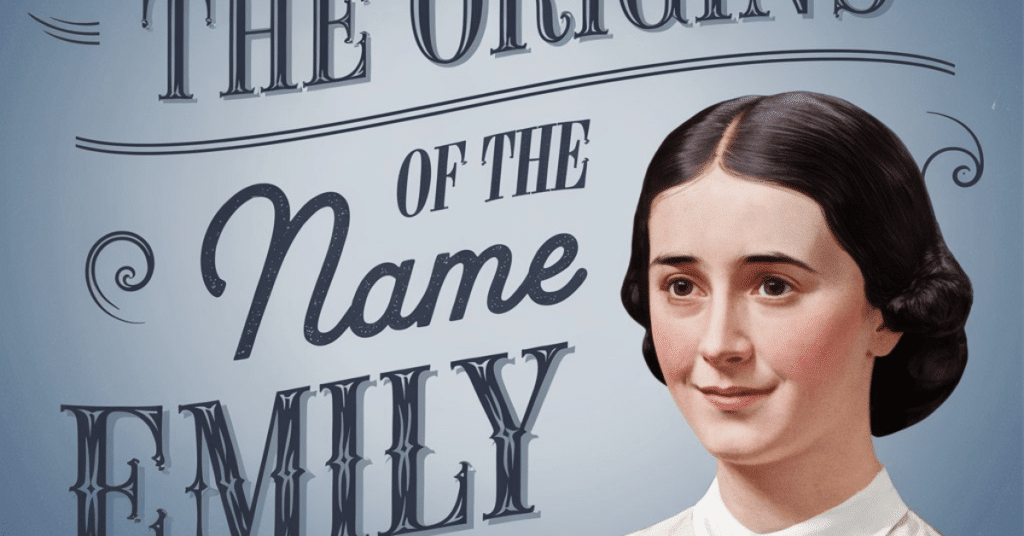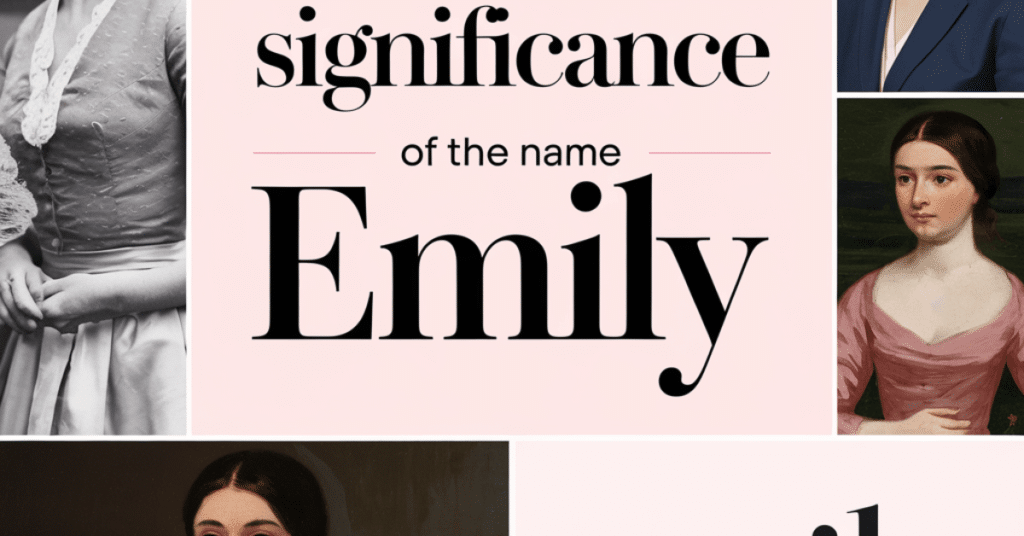The name Emily has long been a favorite among parents, carrying a sense of timeless elegance and charm. Over the years, it has graced the top ranks of baby names in various cultures and regions. But where does the name Emily come from? This article explores the historical roots, meanings, and cultural significance of the name, shedding light on its enduring appeal and spiritual essence.
The Origins of the Name Emily
Historical Roots
The name Emily has deep historical roots, deriving from the Latin name Aemilia, which is the feminine form of Aemilius, a prominent Roman family name. The etymology can be traced back to the Latin word “annulus,” which means “rival” or “eager.” This connection gives Emily a connotation of ambition and competitiveness, traits that have contributed to its popularity over centuries. In biblical terms, names often carry significant meanings that can relate to one’s spiritual essence and journey.

Evolution Through Time
Throughout history, the name has evolved in various forms. In medieval England, the name was often associated with the noble families of the time. Its introduction into the English-speaking world can be traced back to the Normans, who brought the name with them during the Norman Conquest of England in 1066. Over time, Emily became widely adopted across Europe, reflecting both the name’s elegance and its Latin roots. This evolution also aligns with the broader biblical narratives about the significance of names in defining character and spiritual growth.
The Popularity of the Name Emily
19th Century Surge
The name Emily saw a significant resurgence in the 19th century, particularly in England and the United States. Influential literary figures such as Emily Brontë and Emily Dickinson played a crucial role in popularizing the name during this period. Their artistic contributions to literature showcased the name’s sophistication and depth, cementing its status as a timeless classic. This rise in popularity also mirrors the biblical values of creativity and expression found in various biblical teachings.
20th Century and Beyond
By the 20th century, Emily was a staple name among parents, consistently ranking among the top baby names. In the United States, it reached its peak popularity in the late 1990s and early 2000s, often appearing at the top of baby name lists. The name’s enduring appeal can be attributed to its versatility; it suits a wide range of personalities and cultural backgrounds. In this way, the name Emily embodies the spiritual significance of adaptability and growth, much like many biblical names.
Global Variations of Emily
The name Emily has variations across different cultures, each carrying its unique flair. For instance, in Spanish-speaking countries, it often appears as Emilia, while in Italian, it is commonly used as Emilia as well. The French version, Émilie, showcases a different pronunciation while retaining the essence of the name. These variations illustrate how the name has transcended geographical boundaries, adapting to various languages and cultures, akin to the way biblical teachings have been interpreted across different societies.
The Meaning of the Name Emily
Symbolism and Traits
The name Emily is often associated with a variety of positive traits. Those named Emily are frequently characterized as creative, compassionate, and nurturing individuals. The name’s roots in ambition and eagerness suggest a dynamic personality, someone who thrives in competitive environments while also valuing close relationships. This reflects the spiritual journey many individuals undertake, embodying the quest for personal growth and enlightenment that is often highlighted in biblical teachings.

Famous Emilys in History
Throughout history, numerous notable figures have borne the name Emily, further enhancing its cultural significance. Emily Dickinson, one of America’s most celebrated poets, is renowned for her introspective and evocative verses. Meanwhile, Emily Brontë, author of the classic novel “Wuthering Heights,” contributed significantly to English literature. These women have left an indelible mark on their respective fields, showcasing the depth and creativity often associated with the name, much like the spiritual essence of influential biblical figures.
The Cultural Significance of the Name Emily
In Literature and Arts
The name Emily has appeared in various works of literature, often embodying strong female characters. From novels to plays, Emily is depicted as a complex, multidimensional individual who navigates challenges with resilience and grace. This representation has contributed to the name’s lasting popularity and cultural significance. The biblical narratives often celebrate similar qualities, emphasizing the strength and courage found in individuals throughout history.
Modern-Day Usage
Today, Emily continues to be a popular choice for parents around the world. It is commonly featured in popular culture, including films, television shows, and music. The name’s presence in contemporary media reinforces its relevance and appeal, ensuring that it remains a beloved choice for new generations. This modern recognition mirrors the continuing importance of names within spiritual contexts, highlighting their meanings and the values they represent.
Embracing the Name Emily
For those named Emily, the name often serves as a source of pride and identity. Many women named Emily embrace their name’s rich history and connotations, using it as a reflection of their unique personality. Whether in professional settings or personal relationships, the name often carries a sense of dignity and respect, much like the biblical names that reflect one’s character and values.

FAQs
What does the name Emily mean?
The name Emily is derived from the Latin word “aemulus,” meaning “rival” or “eager.” It symbolizes ambition, creativity, and a dynamic personality, echoing spiritual meanings found in biblical teachings.
How popular is the name Emily today?
In recent years, Emily has continued to rank highly among baby names in various countries, often appearing in the top ten or top twenty lists, reflecting its timeless appeal similar to many biblical names.
Are there any famous people named Emily?
Yes, several notable figures bear the name Emily, including poets Emily Dickinson and Emily Brontë, both of whom made significant contributions to literature, showcasing qualities often celebrated in biblical narratives.
What are some variations of the name Emily?
Variations of the name include Emilia in Spanish and Italian, Émilie in French, and other regional adaptations that reflect the name’s global presence, much like variations of biblical names across cultures.
Is Emily a timeless name?
Yes, Emily is considered a timeless name due to its rich history, positive connotations, and enduring popularity across generations, paralleling the significance of names in biblical contexts.
How has the perception of the name Emily changed over time?
The perception of Emily has evolved from a name associated with nobility and literature to a universally loved name that signifies creativity, compassion, and strength, akin to the spiritual growth emphasized in biblical teachings.
What historical figures influenced the popularity of the name Emily?
Emily Brontë and Emily Dickinson, both renowned poets, greatly contributed to the name’s popularity through their literary works in the 19th century, embodying the values found in biblical narratives.
Are there any specific cultures that particularly favor the name Emily?
Emily is popular in many cultures, particularly in English-speaking countries, but variations like Emilia are widely embraced in Spanish and Italian cultures, showcasing the adaptability of names similar to biblical names.
What are some common nicknames for Emily?
Common nicknames for Emily include Em, Emmy, and Millie, offering a range of affectionate alternatives for the name, much like the varied nicknames found for biblical figures.
How has the name Emily been represented in popular culture?
Emily has been featured in various films, books, and television shows, often portraying strong and relatable female characters that align with the traits emphasized in biblical teachings.
Does the name Emily have any specific spiritual or symbolic meanings?
While Emily primarily means “rival” or “eager,” it can also symbolize personal growth and ambition, reflecting the positive traits often associated with those named Emily, similar to the spiritual significance of biblical names.
Is the name Emily used globally?
Yes, Emily is used worldwide, with different adaptations and variations, making it a versatile name across many cultures, akin to the universal nature of many biblical names.
How does the meaning of Emily relate to personal characteristics?
The name Emily is often linked to traits like creativity, compassion, and determination, suggesting that those who bear the name embody these qualities, paralleling the spiritual significance of biblical values.
What influence did the Normans have on the name Emily?
The Normans introduced the name Emily to England during their conquest in 1066, leading to its adoption and adaptation in the English-speaking world, much like the way biblical teachings influenced cultural practices.
Conclusion
The name Emily is steeped in history, cultural significance, and a rich tapestry of meanings. Its origins trace back to ancient Rome, evolving through centuries to become a beloved choice for parents around the globe. As a name that embodies ambition, creativity, and resilience, Emily continues to inspire and resonate with individuals from all walks of life. Whether you bear the name or are simply curious about its roots, Emily is a name that tells a story of strength, beauty, and timeless elegance. Just as biblical names carry deep meanings and significance, so does Emily, reflecting a profound spiritual journey and essence.

